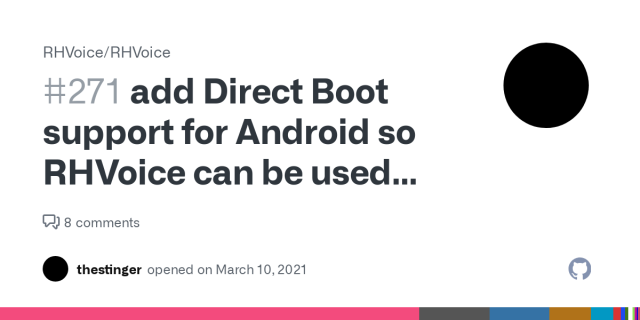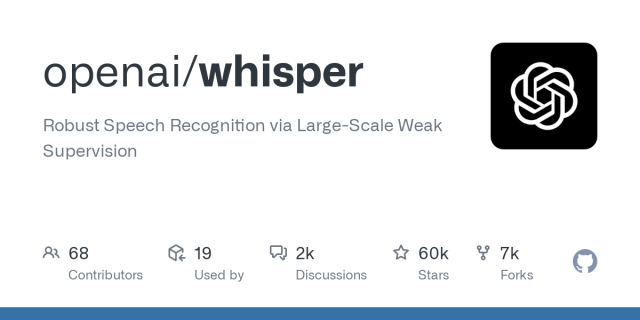Google publishes the source code for their TalkBack screen reader. GrapheneOS maintains a fork of it and includes it in GrapheneOS with the help of a blind GrapheneOS user who works on their own more elaborate fork. Eventually, we'd like to include more or all of their changes.
TalkBack depends on a text-to-speech (TTS) implementation installed/configured/activated. It needs to have Direct Boot support to function before the first unlock of a profile. Google's TTS implementation supports this and can be used on GrapheneOS, but it's not open source.
We requested Direct Boot support from both prominent open source implementations:
RHVoice: github.com/RHVoice/RHVoice/iss…
eSpeak NG: github.com/espeak-ng/espeak-ng…
eSpeak NG recently added it but it's not yet included in a stable release and their licensing (GPLv3) is too restrictive for us.
RHVoice itself has acceptable licensing for inclusion in GrapheneOS (LGPL v2.1), but has dependencies with restrictive licensing. Both these software projects also have non-free licensing issues for the voices. Neither provides close to a working out-of-the-box experience either.
Google's Speech Services app providing text-to-speech and speech-to-text works perfectly. Their proprietary accessibility services app with extended TalkBack and other services also works fine. However, many of our users don't want to use them and we need something we can bundle.
There aren't currently any usable open source speech-to-text apps. There are experimental open source speech-to-text implementations but they lack Android integration.
We also really need to make a brand new setup wizard with both accessibility and enterprise deployment support.
GrapheneOS still has too little funding and too few developers to take on these projects. These would be standalone projects able to be developed largely independently. There are similar standalone projects which we need to have developed in order to replace some existing apps.
AOSP provides a set of barebones sample apps with outdated user interfaces / features. These are intended to be replaced by OEMs, but we lack the resources of a typical OEM. We replaced AOSP Camera with our own app, but we still need to do the same with Gallery and other apps.
Google has started the process of updating the open source TalkBack, which only happens rarely. We've identified a major issue: a major component has no source code published.
github.com/google/talkback/pul…
Google has been very hostile towards feedback / contributions for TalkBack...
This is one example of something seemingly on the right track significantly regressing. Another example is the takeover of the Seedvault project initially developed for GrapheneOS. It has deviated substantially from the original plans and lacks usability, robustness and security.
In the case of Seedvault, GrapheneOS designed the concept for it and one of our community members created it. It was taken over by a group highly hostile towards us and run into the ground. It doesn't have the intended design/features and lacks usability, security and robustness.
All of these are important standalone app projects for making GrapheneOS highly usable and accessible. What we need is not being developed by others and therefore we need to the resources including funding and developers to make our own implementations meeting our requirements.
#grapheneos #privacy #security #android #mobile #accessibility #texttospeech #speechtotext #talkback #blind #backup

More information: https://developer.android.com/training/articles/direct-boot https://github.com/GrapheneOS/platform_packages_apps_Updater is a trivial example of using this. You need to mark a sub...
GitHub


